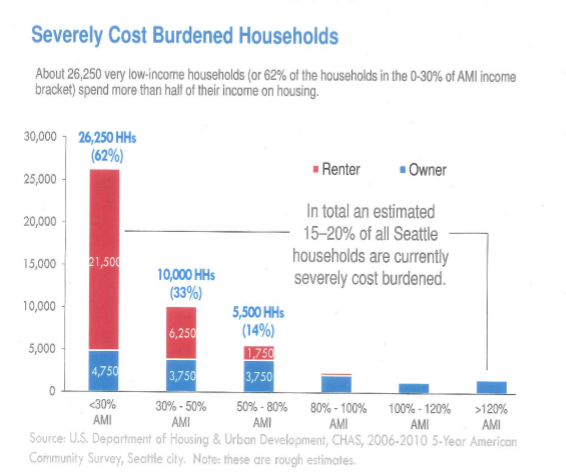Voters this August have the opportunity to take a major step forward in addressing Seattle’s growing housing affordability crisis by supporting Proposition 1, the Seattle Housing Levy. The $290 million proposal renews and expands the current housing levy, which expires at the end of the year, building on 35 years of successful public investment in affordable housing in Seattle.
While we work as a city to address the broader affordability crisis, this levy ensures that social workers, providing crucial services for our community, can live near transit. That kids have safe shelter and a place to study and excel in school. That low wage workers can afford to rent an apartment in the same city that they work in. That artists can thrive, creating the vibrant culture that is part of what makes our city great!
Seattle has a long commitment to the public investment in affordable housing. Beginning with the 1981 Senior Housing Bond, Seattle has since demonstrated a 35-year track record of strong success. This public investment consistently meets and often exceeds our targets for construction and preservation of affordable housing. The levy will provide homes for families and school children, and ensure affordable housing options remain available to our seniors and others living on fixed incomes. Voting yes on Prop. 1, continuing this tradition of public investment in affordable housing, is a smart decision.
The data that we have seen regarding the rising cost of living in Seattle is a real concern. Upwards of 20 percent of all Seattle households are identified as “severely cost burdened,” defined as households spending more than 50 percent of their income on rent and basic utilities (water, sewer, garbage, electricity). For families living at or below 30 percent of area median income, 62 percent—roughly 26,250 households—are severely cost burdened.
The housing levy is a key piece of the City’s comprehensive, multi-pronged strategy to address Seattle’s affordability crisis, Over the last 35 years Seattle has created and preserved over 12,500 affordable homes all throughout the city. Emergency rental assistance has helped 6,500 families during the times when they needed it the most. The housing levy is the single most impactful solution we have to ensure our city remains livable to all residents.
So what does the replacement levy do? Quite a lot. For starters, at least 2,150 units of affordable housing—with a focus on families earning 30 percent or below area median income—will be produced or preserved, along with at least 350 existing units seeing reinvestment to extend their lifespans. This long-term investment creates affordable homes that will be available for low-income Seattle residents for 50 years or more. It will be stable, affordable homes for seniors on fixed incomes, and will ensure that schoolchildren have a safe and stable place to play and study without the worry of where they will sleep tomorrow night simply because they are living in poverty.
Next, this levy more than doubles the investment in the Operating and Maintenance program. This is an unprecedented investment in supportive housing for community members experiencing chronic homelessness. This supportive housing will provide wrap-around services for our neighbors living with mental illness and other disabilities who need additional supports to live independently.
Since 2002, the Housing Levy has invested in homelessness prevention through emergency rental assistance, coupled with case management services, for families facing a high risk of eviction due to being extremely cost-burdened. The easiest way to combat homelessness, after all, is to prevent families from experiencing this trauma in the first place. Over the last 14 years, over 83 percent of families that have been supported by this investment have maintained stable housing for over six months after receiving the benefit.
The 2016 Housing Levy ramps up and expands upon these efforts, providing emergency rental assistance to at least 4,500 families to help them avoid falling into homelessness due to inability to pay rent. With rents across the city increasing by eight percent or more annually—and with some renters seeing $250 or more in monthly increases with little notice—the levy’s emphasis on providing emergency short-term rental assistance and stability services is particularly important. Proposition 1 also provides housing for low-income seniors, people with disabilities, lower-wage workers and families with children.
The levy has environmental and sustainability benefits as well. The suburbanization of poverty, wherein families have to move further and further from urban job centers, often leads to more cars on the road, and more carbon in the air. Providing opportunity for families to live close to transit, jobs, services, and quality schools leads to better outcomes for the environment, and our communities as a whole.
In short, the 2016 Housing Levy expands on the phenomenal work of the prior housing levies, and continues the city’s broad-based approach to meaningfully addressing both the affordability and homelessness crisis we’re experiencing. It deserves our support.
The campaign to pass this measure continues to build momentum. The Mayor and all nine Seattle City Council members are united in endorsing Proposition 1, being joined by the Housing Development Consortium, multiple Democratic Party organizations, the M.L. King County Labor Council, Seattle Chamber of Commerce, Sierra Club, transit advocates, social justice organizations, and many, many more.
Check out yesforhomes.com to learn more about the levy, and ways that you can join the campaign to ensure its success on the August 2 ballot. And be sure to vote YES for Homes, and YES on Proposition 1!
Rob Johnson is a member of the Seattle City Council for District 4 and supports the Proposition YES for Homes campaign. Councilmember Johnson also chairs the City’s Planning, Land Use, and Zoning Committee.
Rob Johnson is a member of the Seattle City Council for District 4 and chairs the City's Planning, Land Use, and Zoning Committee.



